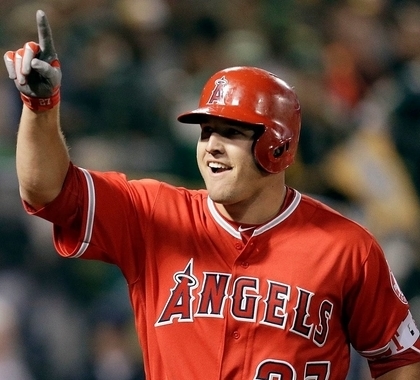Baseball phenom Mike Trout has inked a truly remarkable deal with the Los Angeles Angels: over the next twelve years, the Angels will pay him $426.5 million, or about $100 million more than the Phillies will pay Bryce Harper over the next thirteen years. Sportswriters and commentators should probably go ahead and start taking notes now because we can’t be that far from sports’ first half-billion-dollar contract– and the inevitable think-pieces about what it says about us as a society that we are willing to pay someone half a billion dollars over five or ten or fifteen years to throw, hit, catch, or kick a ball while doctors and teachers toil away for tiny fractions of what we’re paying superstar athletes like Mike Trout and LeBron James. The Washington Post even has the temerity to suggest Trout might be underpaid.
Offering people such gargantuan contracts for playing a game while people do far more important things like educating and healing suggests a serious social sickness, right? Well, not so fast.
Claiming that we’re sick because Mike Trout is paid tens of millions to amuse us while doctors are paid so much less to heal us and teachers so much less to amuse us makes a common mistake: it confuses the totalvalue of an activity with the marginal value of an activity. Sports put up some gaudy revenue numbers: Major League Baseball brought in $10.3 billion in 2018, the NBA produced $7.4 billion in 2017-18, and Bloomberg calls the NFL “a $14 billion per year attention-sucking machine” aiming for $25 billion in revenue by 2027.
This is chump change, however, compared to what Americans spend on schooling. According to the National Center for Education Statistics, “(t)otal expenditures for public elementary and secondary schools in the United States in 2014-15 amounted to $668 billion.” And that’s just public elementary and secondary schools. It’s about 22 times the annual revenue of the three major sports leagues. If education is more important than sports, the spending numbers suggest our priorities aren’t totally out of whack.
So why does the third-grade teacher–or for that matter, the college economics professor–on your block earn so little when we spend so much on schooling? They all have skills people value, but Mike Trout’s skills are a lot more scarce than teachers’ skills. Mike Trout’s skills are worth more than a teacher’s or professor’s skills at the margin: there are so few baseball players that one more player of Trout’s caliber is extremely valuable, apparently to the tune of almost half a billion dollars over twelve years. But one more economics professor? There are a lot of us. One more will make a positive difference, I think, but it won’t be that big.
As valuable as teaching is in aggregate, it is in abundant supply relative to the ability to play baseball at a major league level. There simply aren’t a lot of substitutes for superstar baseball players. At any point in time, there are fewer than 900 people in the world who qualify for a spot on a Major League roster. Meanwhile, there are a lot of substitutes for even superstar teachers. The NCES estimated that there were “3.6 million full-time-equivalent (FTE) elementary and secondary school teachers” in Fall 2016.
Teachers and baseball players have very valuable skills for which society is willing and able to pay a lot. The difference between Mike Trout’s earnings and those of the average teacher come from the fact that a lot of people can teach capably. Meanwhile, not a lot of people can hit a baseball coming at them at 95 miles per hour. So the next time you’re tempted to look at a gigantic sports contract and ask if it makes a disturbing statement about what we as a society value, know that the answer is “only at the margin.”
[Originally Published at Forbes]



